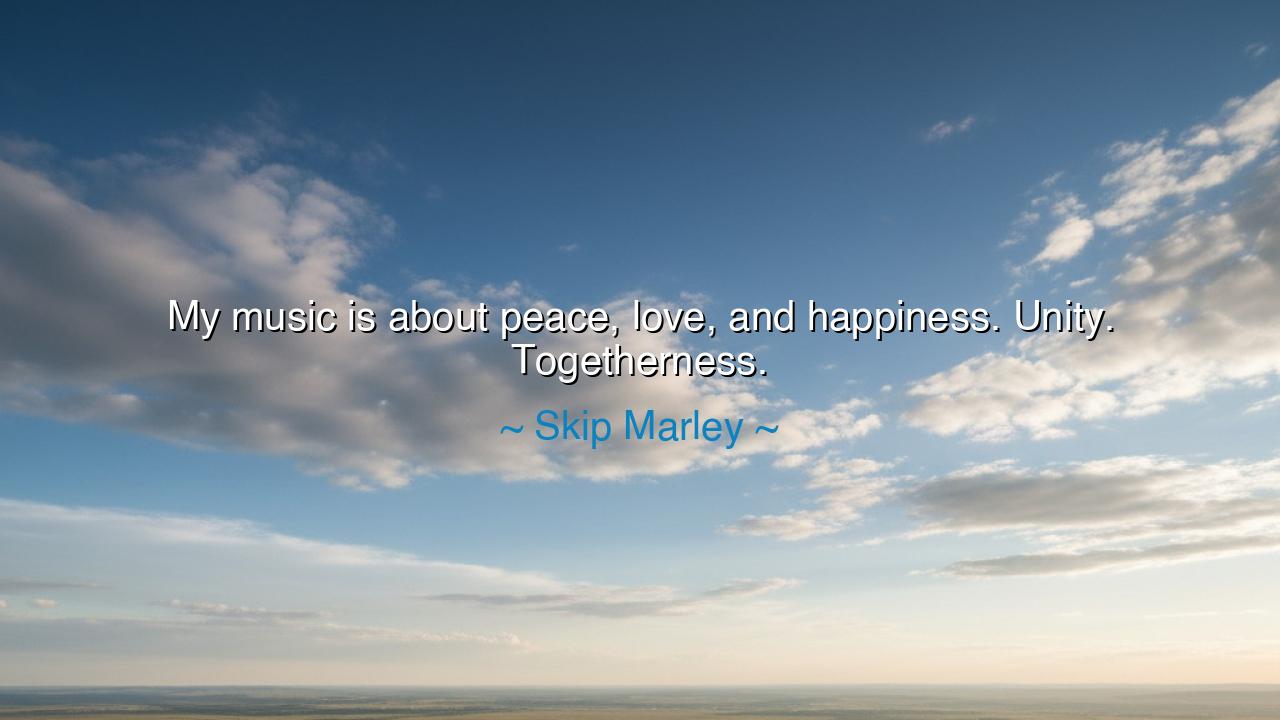
My music is about peace, love, and happiness. Unity.






The musician Skip Marley, heir to a lineage of sound and spirit, once said: “My music is about peace, love, and happiness. Unity. Togetherness.” In this simple declaration lies a profound echo of the eternal human dream—a vision that has traveled through centuries, from the hymns of ancient temples to the songs of freedom sung beneath the open sky. His words are not merely about melody; they are about the purpose of art, the sacred duty of those who sing, play, and speak truth into a divided world. For music, when born of sincerity, becomes more than entertainment—it becomes a bridge between souls, a language of unity that speaks where words cannot.
The meaning of Skip Marley’s words draws deeply from his heritage and from the universal yearning for harmony among people. To create music about peace is to offer healing to a wounded world. To sing of love is to remind humanity of its shared essence. To call forth happiness is to awaken joy where despair has lingered. And to invoke unity and togetherness is to stand against the forces of separation—race against race, faith against faith, heart against heart—that have too often torn mankind apart. In this way, his declaration is both an artistic statement and a moral one, for it claims that the purpose of creation is not division, but reconciliation.
The origin of this vision flows from the river of his bloodline, a heritage steeped in the music of liberation. Skip is the grandson of Bob Marley, the prophet of reggae whose songs carried messages of justice and love to every corner of the earth. Bob’s music was not just heard—it was felt, for it called out to the oppressed and the broken, telling them they were not alone. Songs like One Love, Redemption Song, and War became anthems of hope. Skip Marley carries that flame forward, not as imitation, but as continuation—a living branch of a tree whose roots reach into Africa, whose leaves whisper peace in every language. His quote is, in truth, a reflection of that lineage: that music’s highest calling is to unite what the world has tried to divide.
To understand the power of such music, we need only look to history. Consider the voice of Nelson Mandela, who in the darkest days of apartheid found solace in the music of resistance—songs sung by those who believed freedom could still be born. When the people sang, they felt free, even before the chains were broken. The rhythm gave them courage; the harmony gave them hope. And when Mandela finally walked free, the same songs that sustained the weary became hymns of victory. This is what Skip Marley speaks of when he says his music is about peace, love, and unity—it is the recognition that the heart’s vibration, expressed through sound, can heal the divisions that swords and politics never could.
There is wisdom in understanding that unity does not mean sameness. The strength of humanity lies in its diversity—its countless voices, colors, and cultures blending into a greater harmony. Just as in music, where many notes combine to form one melody, so too must humanity learn to play together without silencing difference. Togetherness is not the erasure of identity, but its celebration in harmony with others. In this sense, Skip’s music is both joyous and revolutionary—it reminds us that peace is not passive; it is an act of courage, of compassion, of creation.
To live by this teaching, one need not be a musician. Every human life is its own rhythm, every word its own lyric, every act of kindness its own song. When we choose to listen—to truly listen—to one another, we begin to compose the symphony of unity that Marley speaks of. We can begin by bringing peace to our speech, love to our actions, and joy to our presence. When we forgive, we strike a note of harmony; when we help another rise, we add strength to the chorus of humanity. This is how we live musically, even in silence—by letting our lives sing of peace, love, and togetherness.
And so, let this message be passed down to future generations: music, when born of truth, has the power to awaken the sleeping heart of the world. As Skip Marley reminds us, peace is a melody, love is its rhythm, happiness its refrain, and unity its grand crescendo. When we align our lives with these forces, we become instruments of the divine song that has played since the dawn of time—the song that reminds us that we are one. And if we but listen, and live accordingly, then perhaps one day, all the voices of the earth shall rise together in harmony—and the world, at last, shall be in tune.






AAdministratorAdministrator
Welcome, honored guests. Please leave a comment, we will respond soon